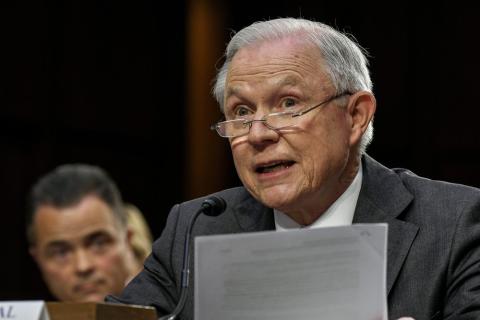https://www.youtube.com/watch?v=SxbWiKKj1MY
Video Source: CBS News
The Associated Press reported Thursday that Attorney General Jeff Sessions is rolling back the Justice Department's policy of more relaxed enforcement of federal prohibition against marijuana in states where it has been legalized by popular ballot initiative or state legislators.
Instead, two sources have told the Associated Press that Sessions will now allow federal prosecutors to exercise their own discretion in deciding how aggressively to enforce federal scheduling laws against marijuana, even in states where it is legal.
A memo dated January 4 and circulated by Jeff Sessions to U.S. prosecutors around the country read:
"In the Controlled Substances Act, Congress has generally prohibited the cultivation, distribution, and possession of marijuana. It has established significant penalties for these crimes... These statutes reflect Congress's determination that marijuana is a dangerous drug and that marijuana activity is a serious crime.
In deciding which marijuana activities to prosecute under these laws with the Department's finite resources, prosecutors should follow the well-established principles that govern all federal prosecutions.
Attorney General Benjamin Civiletti originally set forth these principles in 1980, and they have been refined over time, as reflected in chapter 9-27.000 of the U.S. Attorneys' Manual. These principles require federal prosecutors deciding which cases to prosecute to weigh all relevant considerations, including federal law enforcement priorities set by the Attorney General, the seriousness of the crime, the deterrent effect of criminal prosecution, and the cumulative impact of particular crimes on the community.
Given the Department's well-established general principles, previous nationwide guidance specific to marijuana enforcement is unnecessary and is rescinded, effective immediately. This memorandum is intended solely as a guide to the exercise of investigative and prosecutorial discretion in accordance with all applicable laws, regulations, and appropriations. It is not intended to, does not, and may not be relied upon to create any rights, substantive or procedural, enforceable at law by any party in any matter civil or criminal."
Marijuana policy in the United States is already confusing and contradictory, because even having the plant in your hand or in your pocket is a crime under federal law.
However, 29 states have made it legal to cultivate, sell, possess, and consume marijuana for medicinal and/or recreational purposes.
In many ways, the federal government has acquiesced to the state and popular movement to roll back drug prohibition, beginning with marijuana.
Federal prosecutors have been previously instructed to triage their work load by leaving people who sell or consume marijuana alone in states where it's legal.
But Sessions' memo signals a federal push back against the states over drug policy. One wonders if we will soon see this conflict play out in America's court system.
Certainly, we are already seeing it play out in Congress.
Congress holds the constitutional power over the federal purse, and in every appropriation bill for the Justice Department's budget since 2014, has specifically required that no dollars appropriated for the Justice Department's budget may be used to prevent any state "from implementing their own laws that authorize the use, distribution, possession, or cultivation of medical marijuana."
That doesn't give states with recreational marijuana laws an out, but we will see if Congress will now include recreational marijuana along with medical marijuana in this annual budget provision.
Certainly advocates of legal marijuana or at least state sovereignty over the question will be contacting the representative in Congress and asking them to do just that.
Photo Credit: Mark Reinstein / shutterstock.com
